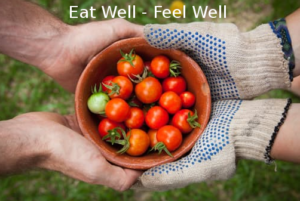What if overcoming excessive nervousness, low mood, low appetite or binging was as simple as eating more veggies?

By gut bacteria manipulating just two neuro transmitters they profoundly influence our mood and behaviour – whether we are anxious or relaxed, how much and well we sleep and how much we eat.
The gut has a kind of ‘brain’ (about 500 million neurons, not many less than the brain) and it produces neuro transmitters. The two main ones are 1) dopamine (50% produced in gut) which is responsible for feelings of reward, pleasure and compulsions and 2) Serotonin (almost all is produced in the gut) which regulates our mood, memory, sleep and cognition. Deficiency in serotonin is linked to depression.
There are hormones produced in the gut that regulate appetite; hormones that signal feelings of hunger and hormones that signal feelings of satiety and fullness and it’s the balance of these two that determines appetite – how much and when we eat. Gut bacteria can alter the levels of these hormones.
The type of food we eat selects for certain types of bacteria which in turn gives us feedback that result in us eating more of the same food. For example eating processed food causes the bacteria that thrive on processed food to grow and they influence our desire to eat more processed food. Likewise eating whole plant based foods cause the bacteria that thrive on whole food to grow and we then enjoy and desire whole food (through the bacteria’s influence in our gut).
If we increase the diversity of gut bacteria we have a greater chance of normalising our appetite, mood and health. How can we do that?
• Play in nature and allow some mud!
• Probiotics to support the growth of healthy bacteria – through supplements, yogurts, fermented foods.
• Prebiotics – these feed the healthy bacteria which eat different types of sugars; Inulin, FructoOligoSaccharides, PolyDextrose, lactulose, lactitol. From: Breast milk, Whole grains, Onions, Garlic, Bananas, Honey, Leeks, Chicory, Artichokes, fortified foods and beverages. Can also come from dietary supplements. Fruit and vegetables are an excellent source of prebiotics.
• The healthy gut bacteria need FIBRE (soluble and insoluble) which is ONLY available in fruit and vegetables (meat, dairy, eggs and processed juice have no fibre)
• Can also have faecal microbial transplant – this is where healthy patient faecal bacteria is transplanted into very ill patient with excellent results.
• Reduce processed foods, avoid alcohol, processed fats, antibiotics in meet and excessive use of antibiotics and other drugs.
A clean diet of whole plant based foods, exposure to bacteria through nature and exercise all long standing health advice has been proven to improve the beneficial gut bacteria and they in turn hugely influence how anxious, depressed, happy or relaxed we feel.
It’s simply a case of eat more veggies and avoid processed food for a few weeks and you’ll want to keep eating that way – and will feel the better for it long term.
Couple of interesting mice study:
• Put the gut bacteria in an adventurous mouse into a timid mouse and the timid mouse became more adventurous i.e gut bacteria influences shyness
• Put slim mouse’s gut bacteria into fat mouse and vica versa and feed them the same kind of food and the slim mouse got fat – the fat mouse got slim i.e gut bacteria determines appetite and weight gain.
Have a lovely week.
With Love,
Ailish
info@DublinMindTraining.com
087 2201 453